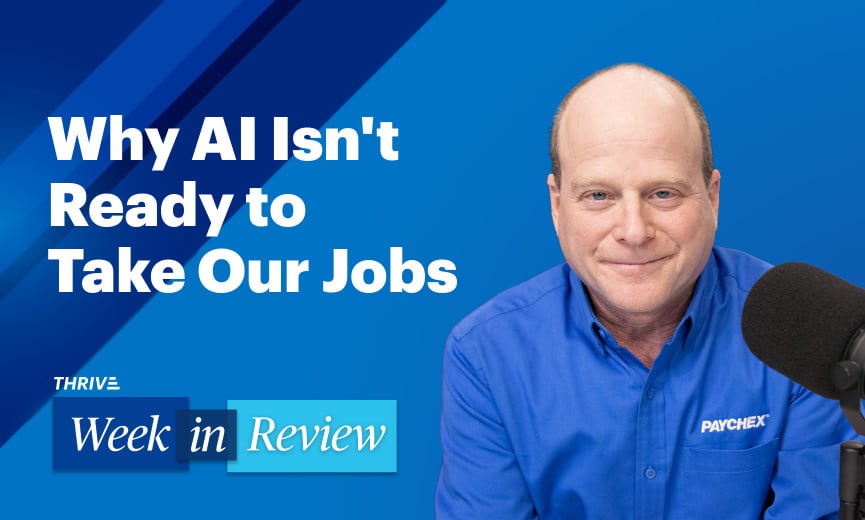- Thrive
-
Season
4Episode171
New Final OT Rule: What Businesses Must Know about Compliance
Podcast •
Watch
Summary
With the new Final Overtime Rule in effect as of July 1 – except for the state of Texas, as an employer after a federal district court issued a preliminary injunction from the DOL enforcing it on the state – Gene Marks has a conversation with Tammy Tyler, Manager of Employment Law Compliance at Paychex, to explain what businesses need to know. They talk about salary thresholds, duties tests, strategies for the workplace, and avenues employers can consider to help understand their compliance requirements. Watch or listen to the podcast.
Topics Include:
00:00:00: Episode Preview
00:01:00: Introduction of Tammy Tyler
00:01:21: New Overtime Rule in effect
00:01:41: Explaining the new rule
00:04:18: Changes in amount of salary threshold for OT Rule
00:05:40: Salary threshold is a per-week basis
00:06:34: Significant and additional increase to threshold coming Jan. 1
00:07:39: Which employees does this rule actually impact?
00:09:37: Consider a workplace policy on overtime policy
00:11:07: Bonus and other remuneration – what impacts do they have?
00:12:18: Why tracking time for nonexempt employees is crucial
00:13:10: Negative outcomes of noncompliance
00:14:05: Actions businesses can take to ease the transition
00:15:26: Wrap-up and thank you
Learn more about the DOL Final Overtime Rule and Salary Thresholds.
View Transcript
Tammy Tyler [00:00:00 - 00:00:26]
Yeah, everybody should be, you know, looking to comply with those regulations. But I also want to say people should be watching the developments. You know, the rule has been challenged in the courts. We expect to see some more activity there. But right now, need to comply. And if you need help doing that, certainly be reaching out to, as I said, you know, an HR solutions provider, a trusted HR professional.
Announcer [00:00:27 to 00:00:43]
Welcome to Paychex THRIVE, a Business Podcast, where you'll hear timely insights to help you navigate marketplace dynamics and propel your business forward. Here's your host, Gene Marks.
Gene Marks [00:00:45 - 00:01:19]
Hey, everybody, it's Gene Marks. And welcome back to another episode of the Paychex THRIVE podcast. I've been warning you guys now for many weeks that this overtime rule change is going to come and be effective. And it is effective as of July 1. So here it is.
I've got Tammy Tyler here with me. Tammy is an Employment Law Compliance Manager at Paychex. Tammy knows everything there is to know about this overtime rule change. I don't want to, that puts a little bit of pressure on you, Tammy, so I don't want to freak you out or anything.
Tammy Tyler [00:01:19 - 00:01:21]
The big sell, yeah.
Gene Marks [00:01:21 - 00:01:41]
But, yeah. So, Tammy, first of all, thanks so much for joining. I'm glad that you are here. Our audience wants to hear from you. So, this overtime rule has gone into effect on July 1. So, let me hand the floor over to you. What are you telling your clients at Paychex? What should they need to know about this overtime rule?
Tammy Tyler [00:01:41 - 00:03:10]
Well, hopefully, our clients are pretty knowledgeable already, and they're aware that under the Fair Labor Standards Act, which is the federal wage and hour law, that they are required to pay their employees at least the minimum wage for all hours worked and then an overtime rate for hours over 40, unless they have employees who are exempt from those provisions. And there's a variety of exemptions.
But the ones in the news, as you say, are definitely the Executive, Administrative, and Professional exemptions or white-collar exemptions from the Fair Labor Standards Act. And that's really kind of the focus of this final overtime rule that was effective yesterday, as you have pointed out, and we will continue to say, to make sure people are aware, you know, those exemptions have some criteria that are defined and delimited by the regulations that the Department of Labor has issued.
The final overtime rule changes those a little bit. Those employees still need to be paid on a salary basis, so they get the same amount of money every week regardless of the quantity or quality of work that they do. They have to meet a series of duties tests, and then they have this minimum salary threshold. And here's really the thrust of the final overtime rule that was effective yesterday. They have increased that. So, effective July 1, those employees need to make at least $844 a week.
[00:03:11 - 00:04:14]
So, first of all, we want to make sure that our clients understand that first increase. The final rule also has included a second increase that will be effective Jan. 1. And then they've included automatic updates every three years starting in July of 2027. So, as you pointed out, you've been telling everybody, it's coming, it's coming, it's here. So, I'm hopeful that our clients have certainly done their preparations to implement that and make sure that they evaluated impacted employees, looked at those salary levels who would need to either have their salary increased above the threshold or make a choice to reclassify those employees as a nonexempt employee.
Lots of things went into that decision, hopefully. In some cases, they may have even wanted to reach out to a trusted HR professional, maybe even legal counsel to make those decisions. So ...
Gene Marks [00:04:14]
Got it.
Tammy Tyler [00:04:15 – 00:04:17]
We are saying implement.
Gene Marks [00:04:18 - 00:04:53]
Yeah, that's fair enough. You would mention about, like, the weekly salary. So, let's annualize it, just also to put that into perspective. So, my understanding is that if you have any employee ... Before July 1 of this year, if you had an employee that was nonexempt and they were making more than, I think it's $35,568 annually, and they were making more than that, they wouldn't be, you wouldn't be mandated to pay them for overtime, and then that number on July 1 has now increased, correct?
Tammy Tyler [00:04:53 - 00:05:14]
So, again, you're not, right? So, if they're making less. If they're ... Yeah, the number now has gone to $43,888. But again, it really is a weekly requirement that's ... they've just given you that annualized dollar amount to give you a kind of an idea, but they do need to make it work.
Gene Marks [00:05:14 - 00:05:40]
When you say it's a weekly requirement ... So, I mean, it's, so, that basically, if we have a salaried employee, most companies pay that salaried employee the same amount every week. Correct. So … right? So, if they're making $800 a week, they're making $800. It usually doesn't fluctuate that much when they're on salary. So, if you're an employer, that's what you should be focusing on. Is that that weekly amount, is that correct?
Tammy Tyler [00:05:40 - 00:05:57]
Right, because as I mentioned earlier, in order to be qualified under one of those exemptions, you need to be paid on a salary basis, and salary basis by definition, under the regs, is you are paid the same amount every week, regardless of the quality or quantity of that work.
Gene Marks [00:05:57 - 00:06:04]
That's super helpful, actually. And what about if you pay your salaried workers bi-weekly? Is that also considered to be ...
Tammy Tyler [00:06:05 - 00:06:11]
Yeah, that's okay, right? But that weekly amount that you've allotted to them needs to, to stay the same.
Gene Marks [00:06:11 - 00:06:27]
All right. That is, that's super helpful. So, the weekly amount goes up to $844 a week starting on July 1. So, anybody that's making less than that amount weekly would have to pay overtime, assuming that the eligible for overtime.
Tammy Tyler [00:06:27 - 00:06:28]
Yeah, overtime.
Gene Marks [00:06:28 - 00:06:34]
Good. That's a good way to put it. And then what does that $844 go up to on Jan. 1, 2025?
Tammy Tyler [00:06:34 - 00:06:38]
Yeah, $1,128 a week.
Gene Marks [00:06:38 - 00:07:00]
Gotcha. Okay. So, it jumps. It really does. And that's almost like $49,000 a year. So, I have some clients saying, like, wow, we've got some employee, you know, we've got this employee that say they're eligible for overtime. We didn't have to pay them overtime if they were making more than about $36,000. And now by Jan. 1 of 2025, it's gonna go up as high as, you know ...
Tammy Tyler [00:07:01 - 00:07:07]
It's like $58,000. Yeah, a little bit.
Gene Marks [00:07:07 - 00:07:39]
$59,000. So, it's a big jump. So, it really is making a lot of employees eligible for overtime now. And in fact, I think the Biden administration said it was something like close to 4 million workers would be eligible for more overtime payments. Yeah, that's the thing that really is.
So, okay, some more questions for you. So, as far as the exemptions, the employees that do get exempt, can you talk a little bit? First of all, I always get this question, so I'm sure you do as well. How about salespeople? They're exempt, right? I mean, people, people always ask me about this.
Tammy Tyler [00:07:39 - 00:08:02]
Outside salespeople can be exempt, and there are some duties for them, too. They actually are not impacted by this change in the rule, Gene. This is for the Executive, Administrative, and Professional employees, which is a little bit different in terms of the job duties and how they're paid. Salespeople, as you know, can be paid commissions. So, it's a little bit different than a salary.
Gene Marks [00:08:02 - 00:08:23]
Right? So, for the most part, salespeople would be exempt. And then you talk about, like, executive, you know, and white-collar employees. I mean, how about those employees that are, like, customer service or they work. They're a salaried worker in the warehouse, for example, like a production person. You know, I mean, where do they generally ...? I realize there's a lot of details. I mean, it depends on the description.
Tammy Tyler [00:08:23 - 00:09:00]
But it's a very common question. But I'll remind you that they have to meet those duties, tasks, and generally somebody who's in a customer service position or in the warehouse is not going to meet that. I will clarify that a nonexempt employee who's eligible for overtime can be paid on a salary basis, but you still need to track their hours and make sure that they're making at least minimum wage. And they are making that overtime rate of time and a half of their regular rate of pay for the hours over 40. But they can be paid a salary. You just might be paying them more than that salary.
Gene Marks [00:09:00 - 00:09:37]
Right. Okay, that makes sense. So, what do we do here? Like, you know, say, you know, again, this is just questions that my clients asked me. Some of them are like, okay, well, we now have an employee who is formally, you know, would now be eligible for overtime because the wage increases. What if I have a policy that just says there's no overtime? Like, you know, you know, and you're not. We're going to enforce that. And, you know, any overtime hours, any hours more than 40 hours you expect to incur needs to have approval by a supervisor or something like that. That seems like one good strategy, right? Just say there's no overtime.
Tammy Tyler [00:09:37 - 00:09:58]
Absolutely, absolutely. I think everybody should have a policy about their overtime. You know what the expectation is, who you have to get approval for by when you have to get approval. I will note that doesn't relieve you from having to pay the overtime if they work it, but definitely strongly recommend having a policy so the employees know what to do, right? And managers know what to do.
Gene Marks [00:09:58 - 00:10:31]
Yeah, I'm laughing that you just said that because that stung me. I was working on a piece on this for the Philly inquiry just this past week, and I spoke to a couple of labor attorneys. They said exactly what you said. Like, even if you have the policy, but then the people still work the overtime, you know, that's in violation of a policy, but they still do it. The attorneys that I talked to now, again, this is, you know, it depends on your situation, but said that, no, you still have to pay that overtime even though, even though you told them don't work the overtime, the employer works in any way that's important.
Tammy Tyler [00:10:31 - 00:10:38]
You can discipline them or tell them that that's against company policy. But yes, under the wage and hour laws, you do still have to pay them.
Gene Marks [00:10:39 - 00:11:17]
Crazy. Okay, so that's really, really important. So that's one strategy, though, is to have a policy to strictly enforce it, to make sure that it's communicated, to try and really limit anybody working more than 40 hours a week. You had mentioned earlier, I mean, you could change their pay from salary to hourly, right? and whatever they make ...
Okay. And when we're paying overtime, though, under this, you know, under this rule, it's time and a half, correct? It's not. It's time and a half.
Tammy Tyler [00:11:07 - 00:11:29]
Time and a half their regular rate of pay. So that's, you know, probably more than you want to hear now. But there's, you know, you need to calculate their regular rate of pay by including all of their remuneration for that week. So maybe they got a bonus or, you know, and then divide that by the number of total hours worked. But generally, yes, time and a half the regular rate of pay.
Gene Marks [00:11:29 - 00:11:41]
And does the rate of pay itself, and again, I'm like, I'm putting you on the spot here, and I apologize. But, like, how about, like, benefits? Like, say they're getting, like, health insurance or, you know, retirement contribution. Do we figure that into the rate of pay?
Tammy Tyler [00:11:41 – 00:11:43]
No, we do not.
Gene Marks [00:11:44]
Yeah, I didn't, I …
Tammy Tyler [00:11:44 - 00:11:48]
There are some things that do need to be included, but that. Your benefits, health benefits would not be included.
Gene Marks [00:11:48 - 00:12:17]
I've had other clients ... I love, I love grilling you on this. We'll see. We'll see how good you are. So, I have other clients that have said that, well, we'll just keep their salary underneath the weekly amount, and then at the end of the year, we'll just give a year-end bonus. And that way we avoid paying them overtime if their salary was more than in that range. I mean, can you monkey around bonuses or is that just something that's ...?
Tammy Tyler [00:12:18 - 00:12:39]
Not really for nonexempt employee, right? For a nonexempt employee, you really need to track all of their hours worked, make sure that they're paid and that they're getting an overtime rate. You can give them a bonus at the end of the year in addition to that. Of course, I'm sure they'd be very happy for that. But if they're staying nonexempt, you're going to need to track all that.
Gene Marks [00:12:39 - 00:13:10]
Got it. Okay. That makes complete sense. So, I've also, when I talk about this with business groups, I always warn them that, like, you know, the chances of the Department of Labor auditing you, state or federal, it's, you know, you can play that game, but your employees have the internet. So, you know, the chances of them reporting you to the Department of Labor if they feel they're being underpaid, that is not an insignificant chance, correct?
Tammy Tyler [00:13:10 - 00:13:20]
Yeah, no, you're absolutely right. And, you know, when they audit you, they might be looking at more than just that employee. So, it's a risk, right?
Gene Marks [00:13:20 - 00:13:41]
Yeah, it really is. And, you know, if you're not paying these overtime wages or calculating them the right way, it's considered to be wage theft by some. And it's, it's not exactly a great PR move for your company. Nor, you know, you don't want an article on your local news organization saying that, you know, your company's participating in wage theft, so ...
Tammy Tyler [00:13:41 - 00:13:45]
Yeah, you're hard to recruit, hard to recruit new employees, for sure.
Gene Marks [00:13:45 - 00:14:05]
That absolutely makes it a little bit hard to attract talent to your company when there's been rumors of you having wage theft. It's not a good thing. Okay, so bottom line, Tammy, what should all of our clients be doing right now? Now that this change took effect in July, who should we be talking to and what kind of questions should we be asking?
Tammy Tyler [00:14:05 - 00:15:01]
Yeah, everybody should be looking to comply with those regulations. But I also want to say people should be watching the development. You know, the rule has been challenged in the courts. We expect to see some more activity there, but right now need to comply.
And if you need help doing that, certainly be reaching out to, as I said, you know, an HR solutions provider, a trusted HR professional, maybe your legal counsel, just to help you not only to comply with it, but you're also going to be developing, or should have developed, you know, some, some good communications to share, you know, the changes with your employees. And training, and really just want to make sure that your morale of all of your employees are not impacted in a negative way. So, it's a lot to think about, and there may be some of those, if not all of those areas where you do need assistance.
Gene Marks [00:15:01 - 00:15:22]
Great. Tammy Tyler is an Employment Law Compliance Manager at Paychex. We've been talking about the change that happened on July 1 to these overtime rules, which can very well result in you paying more for overtime compensation. You need to make sure that you are figuring that out. The change happened July 1 and there will be yet another change on Jan. 1, 2025.
Tammy Tyler [00:15:22 - 00:15:26]
Another scheduled change Jan. 1, that's correct.
Gene Marks [00:15:26 - 00:15:36]
We have to be ready for that. So, Tammy, thank you so much for updating us on this. I'm sure we'll be talking to you again before the end of the year to remind everybody what is going on and any updates. But thank you very much.
Tammy Tyler [00:15:36 - 00:15:38]
That'd be great. Nice talking to you, Gene.
Gene Marks [00:15:38 - 00:16:15]
Great talking to you, as well. Do you have a topic or a guest that you would like to hear on thrive, please let us know. Visit payx.me/thrivetopics and send us your ideas or matters of interest. Also, if your business is looking to simplify your HR, payroll, benefits, or insurance services, see how Paychex can help. Visit the resource hub at paychex.com/worx. That's W-O-R-X.
Paychex can help manage those complexities while you focus on all the ways you want your business to thrive. I'm your host, Gene Marks, and thanks for joining us. Till next time, take care.
Announcer [00:16:17 - 00:16:22]
This podcast is property of Paychex, Incorporated, 2024. All rights reserved.

 Apple Podcast
Apple Podcast Spotify
Spotify iHeartRadio
iHeartRadio









